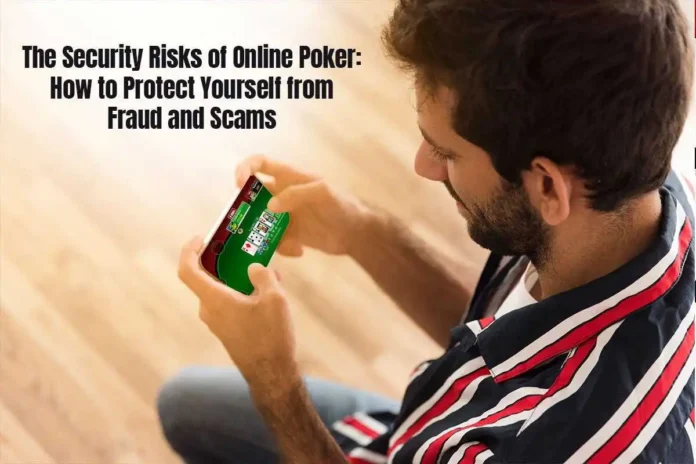Online Poker, often categorized as a skill-based game, has surged in popularity with accessible digital platforms allowing players from around the world to compete in real time. However, the convenience of online Poker games real money also brings security risks that players must be aware of to avoid fraud and scams. From hacking attempts to phishing scams, online Poker players face various threats, making it crucial to understand and adopt preventive strategies.
Let’s explore the primary security risks in online Poker and how you can keep yourself safe.
What are the common security risks in Online Poker?
● Phishing scams
Phishing remains one of the most rampant methods used by cybercriminals to exploit online Poker players.
In phishing, scammers usually impersonate legitimate Poker sites or popular Poker brands to trick users into revealing their login credentials or personal information.
Phishing emails typically contain links leading to fake websites that resemble real Poker platforms.
Once you enter your login details, the cyber attacker gains access to your account, which may hold sensitive data and financial information.
● Malware & spyware
Malicious software can be embedded in fake Poker apps, emails, or even advertisements, allowing hackers to monitor your online activities, including keystrokes, to gain access to your accounts.
With spyware installed, hackers can view your Poker hand in real time, effectively compromising your gameplay and potentially stealing your winnings.
Furthermore, malware can also grant attackers access to your financial data, leading to potential financial losses.
● Account Takeovers
Account takeover (ATO) fraud involves cybercriminals obtaining unauthorized access to a player’s Poker account, typically through stolen credentials. This can occur if a player uses the same password across multiple platforms or is careless about online security.
Once in control of the account, hackers can transfer funds, misuse personal data, or engage in fraudulent activities that compromise the player’s privacy and finances.
● Payment fraud
Online Poker real-money games or tournaments involve financial transactions, making payment fraud a significant risk. This can include unauthorized charges, fake transactions, and stolen payment details. Unsecured payment gateways or compromised systems can expose players to risks where their financial data is stolen or misused. Fraudsters may also use stolen payment details to launder money through Poker platforms, a practice that is becoming increasingly common.
Here’s how you can safeguard yourself
● Choose a trustworthy, reputable Poker platform
The first line of defense against online Poker fraud is selecting a reputable and licensed platform. Search for Poker websites with a solid track record, verified reviews, and visible security certifications, such as SSL encryption, to ensure your data is safe during transactions. Well-known Poker platforms usually have better security measures, including anti-fraud technologies, to reduce the likelihood of scams.
● Create a strong password for your Poker account
Creating a strong, unique password for your online Poker account is essential. Avoid reusing passwords across different sites, especially for Poker platforms and other sites that involve financial transactions.
Your password must not be your birth date or anniversary date but a combination of uppercase and lowercase letters, numbers, and special characters. You can also consider enabling two-factor authentication (2FA) wherever possible. 2FA adds an extra layer of security by needing a second form of verification, such as a one-time code sent to your phone.
● Beware of phishing attempts
Phishing scams can be highly convincing, often mimicking legitimate communications from Poker sites. To avoid falling victim, always double-check the email address of the sender and never click on links or download attachments from suspicious sources. Rather than using the link in the email, directly type the Poker site’s URL into your browser or use a bookmarked link you trust.
● Use anti-malware and antivirus software on your device
Using reliable antivirus and anti-malware software is crucial in preventing spyware and other malicious software from infiltrating your device. Regularly update your antivirus software to ensure it can identify and annihilate the latest threats. Many antivirus programs also offer real-time protection, which can help stave off the installation of malware on your device without your knowledge.
● Monitor the activity in your Poker account
Frequently review your Poker account activity to catch any unusual or suspicious behavior. Look out for transactions or logins that you don’t recognize, as these can indicate unauthorized access. Most reputable Poker platforms have activity logs where you can monitor login history and transaction details. If anything appears suspicious, change your password immediately and contact the platform’s support team.
● Avoid public Wi-Fi networks
Playing Poker on public Wi-Fi networks can expose you to a range of cyber threats. Public networks are often unencrypted, making it easier for hackers to intercept data. If you must use a public Wi-Fi network, consider using a Virtual Private Network (VPN) to safeguard your connection and encrypt your data. A VPN also masks your IP address, adding an extra layer of anonymity.
● Only use secure payment methods
Only use secure and well-known payment methods when transfering funds to your Poker account. Credit cards, e-wallets, and other established digital payment methods offer added layers of security, including fraud protection and chargeback options.
Do not use unfamiliar payment providers that might lack the latest security features.
Summing up: Staying watchful is key to defending yourself from fraud and scams and enjoying the online Poker experience.
While online Poker platforms continue to improve their security measures, players must remain vigilant and proactive in protecting their personal and financial information. By understanding the different types of fraud and implementing preventive strategies, such as choosing reputable platforms, monitoring account activity, and using secure payment methods, you can significantly decrease your risk of falling victim to online Poker scams.



































